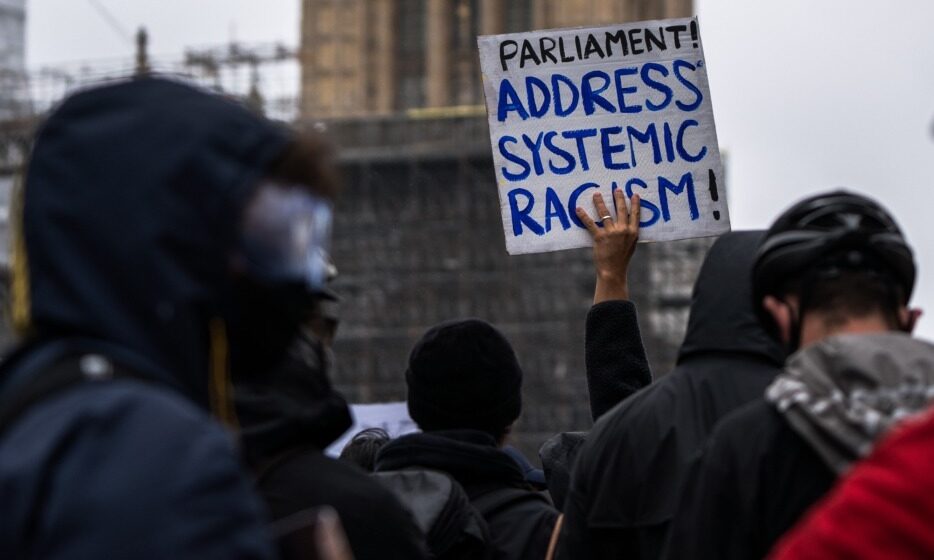Britain is institutionally racist. No report can negate that
In March, Downing Street and The Commission on Race and Ethnic Disparities published a report. It was met with much criticism, as the report itself minimises institutional racism, saying that there was no evidence. Instead, it shifted the blame to factors such as individual responsibility and family background.
This section of the report faced particular outrage. Many academics stated that the report itself “cherrypick[ed]” information to justify pre-determined answers, and was overall of low quality.
Institutional racism is something that is built into the fabric of Britain
Firstly, to say that there is no actual evidence to support claims of institutional racism in Britain has to be some sort of poorly thought-out joke. This is a huge slap in the face for so many minorities in the UK. Institutional racism is something that is built into the fabric of Britain. British merchants had huge roles in the Atlantic slave trade. Britain itself murdered, raped, and pillaged one-third of the world. The British Empire is the symbol of racism, and ‘British pride’ is something that has been built on the back of this flag and its more sinister history whether you choose to acknowledge it or not.
Institutional bodies continue to fail minorities in this country
Perhaps some may disagree. The British Empire was some time ago – “we have changed since then.” But have we? Look around at everything that has happened over the last twelve months, over the last few years, over your lifetime, and ask yourself if we are any further away from institutionalised racism than we were 30, 50, or even 100 years ago.
Institutional bodies continue to fail minorities in this country. The evidence plasters our headlines every day. Let’s begin with an analysis of our police force.
Unfortunately, the news of Richard Okoroghyeye’s death lately broke through the country to the dismay of the public. A bright young Oxford Brookes IT undergraduate, his life was unfortunately cut short, and his mother left behind, lonely and grieving.
When Richard Okorogheye originally went missing, the police officer retorted to his mother, Evidence Joel, that “if you can’t find your son, how do you expect police officers to find your son for you?” Police officers’ jobs are to protect the British public, our families, our loved ones – yet they seemed to have little care for this bright young man and the urgency of his absence. However, UK authorities had no issues in spending £11.75 million, along with endless hours of manpower, to try and find Madelaine McCain who went missing in Portugal.
Blessing Olusegun was a young business student on placement for a week in Bexhill when her life was tragically cut short. She was found deceased on a beach in East Sussex. Police deemed her death as “unexplained” and “non-suspicious”. Little energy was given to Blessing’s case by the media and by the Sussex Police. Only when the unfortunate murder of Sarah Everard happened was her case brought to light. Not nearly on the same scale. The coverage did lead to an inquest into Blessing’s case, which is a positive thing. However, it should have been done at the time. The same amount of effort should have been given to Blessing’s case as to Sarah Everard’s. She deserves justice too, and was very much failed by the police service in this country.
We could also turn our gaze to healthcare in this country. The Office for National Statistics ONS stated that black people were at a “fourfold higher risk of dying” than white individuals. During the pandemic, those with a black African heritage had the highest death rate involving Covid-19 – which was 2.7 times higher than their white counterparts. Furthermore, the death rate of those with black Caribbean ethnic heritage was double that of white women.
The report stated that it did not consider health inequalities such as the statistics mentioned previously to be a result of racism. They declared it was it was a result of factors such as “deprivation and poor housing rather than ethnicity.” However, as Sir Michael Marmot, who is a pioneer of research of health inequalities, said, these factors are themselves “the result of longstanding inequalities and structural racism.”
Marmot stated that the use of outdated references and the minimisation of the health disparities structural racism causes in this report was a huge misgiving of the very much critiqued report. Furthermore, even the use of the term BAME itself in such a report is very outdated – and calls into question its overall credibility.
Perhaps if the commission had more individuals such as Marmot on the team, or had even attempted to gain more insight than purely surface level agendas, then their findings would not have been so harshly critiqued and would have been adjoined with some credibility.

Comments